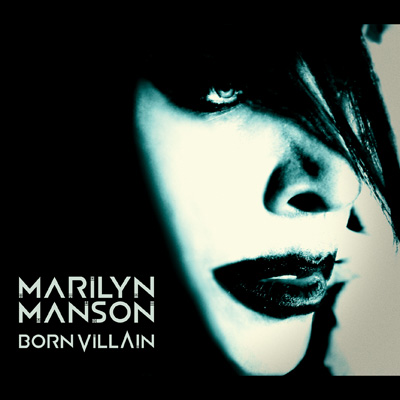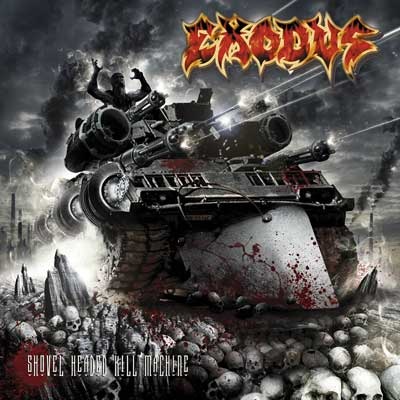 Once, Marilyn Manson was something. That something may or may not have been good, but it was. He was interesting. He was a spectacle.
Once, Marilyn Manson was something. That something may or may not have been good, but it was. He was interesting. He was a spectacle.
“Was” is past tense.
Has anyone even listened to this album right the way through? Can anybody muster even the slightest interest in any of the songs? Does anybody know or care when one track ends and the next begins?
This album is so featureless and uneventful that sometimes I forget that it exists. I start absently wondering whether there will be a new Manson album soon, and then I remember that one did, in fact, come out, and this is it. Then I listen to part of a song or so on Youtube. I never finish it. Marilyn Manson’s music from the past ten years has the positive trait of making things in your environment seem unnervingly interesting, such as a sleeping cat, a bit of fluff on the floor, etc.
Born Villain is the musical equivalent of pushing a broken shopping trolley. It is slow, tedious, and unrewarding. Where are we going here, Brian? “Hey, Cruel World” is an effort at bringing back the gritty hate punk of “Irresponsible Hate Anthem”, but it sounds laboured and lethargic, like someone set the metronome thirty clicks too slow. “Slo-Mo-Tion” is offensively worthless dribble with no reason to exist. Nice drumming, too. Sounds like a GarageBand drum loop.
“The Gardener” has Big Bri spruiking his stupid beat poetry to the backdrop of bass guitar and more drumming c/o GarageBand. Calling this boring is an insult to honest God-fearing boring things everywhere. There’s no energy or inspiration on either side of the speakers. Brian just doesn’t care. You can almost see the studio execs holding up a “YOU CAN STOP PLAYING NOW” sign.
It’s Twiggy’s second album back in the band – remarkable, as virtually nobody lasts for two consecutive albums in Marilyn Manson. Chris Vrenna is credited for about a million things. I don’t know much about that guy, except that he made some remixes of Rob Zombie songs back in the day. Otherwise it’s Brian’s show. I assume his midlife crisis is in full swing by now, with publicity quotes like “Sometimes you don’t know how the fuck to be yourself, because you’re too confused by the circumstances you’re in.” Don’t hope that the old Manson magic is coming back any time soon. Manson himself has forgotten it.
The desperation becomes very tangible on track 14, Carly Simon’s “You’re So Vain,” a guileless attempt at creating a crossover hit like “Sweet Things (Are Made of This)”. This was my favourite song as a kid and he makes into a non-event just like the others. Johnny Depp is on the song. I shouldn’t have mentioned him because now I’m thinking about The Onion’s Johnny Depp Now Completely Made Of Scarves And Bracelets instead of Born Villain.
It is not as terrible as Eat Me, Drink Me. That’s another tick in the boredom column, as it fails even to be entertainingly bad. I won’t call Born Villain music because that might trigger Pavlovian reactions towards much better things. I won’t call it “noise” because even noise is sometimes more interesting than this. Maybe it should be classified as an “alternative to silence”.
“Hey, have you heard Marilyn Manson’s new alternative to silence? I haven’t, either. No-one has.”
 This is the infamous album recorded in prison by black metal musician Varg Vikernes.
This is the infamous album recorded in prison by black metal musician Varg Vikernes.
Given Varg’s troubled past, troubled present, and (most likely) troubled future, it would be easy to say that Dauði Baldrs is most interesting because of the man who made it. Musically, it isn’t such of a much. Varg was only allowed a midi keyboard, and he made an album that pushes the boundaries of the term “minimalist.”
Dauði Baldrs is thirty nine minutes of droning, repetitive 8-bit melodies, meant to articulate the death of the Norse god Baldr (the lyrics missing from the album can be read on the Burzum website). “Í Heimr Heljar” agitates things a bit with some percussion, but mostly the album consists of monophonic synth and piano themes, like Philip Glass making videogame music.
Some accuse the album of sounding hopelessly repetitive, but honestly it’s no more repetitive than Burzum albums released on the other side of the bars. I think it’s meant to sound like this, and that Varg uses repetition as an intentional artistic device. This album pounds basic and simplistic ideas through your head with the unvarying repetition of a punch press machine, causing you to disassociate from what you’re hearing. The result is a little like hypnosis: you feel completely adrift, and unmoored from reality. If it’s done properly (and has the necessary inspiration), music doesn’t really need to get any more complex than this, and Dauði Baldrs can be seen as a brief exercise on how to do less with more.
Scott McCloud once said something about how art equals abstraction. Charles Schulz doesn’t need to draw every hair on Charlie Brown’s head. A few quick rakes with a pencil are enough. In the same way, Dauði Baldrs presents a highly abstract set of ideas that are not fully realised (which would be with guitars, orchestration, and whatever else ), and the attendant assumption that your own imagination will fill in the missing parts. It’s not as abstract as music can get, though. Truly abstract music is not audible at all, it’s written — sheet music on a piece of paper.
I like video game music (I refuse to call it “chiptunes”), but even that comparison misses the mark. I can’t do anything more but describe Daudi Baldrs as “abstraction”. Varg is sharing his musical ideas with us through an 8-bit midi keyboard, and hoping our brains will decode it back into music again.
Its entertainment value is questionable, but Dauði Baldr is a good example of art bypassing technical limitations like a spy weaving through enemy picket lines. One thing remains certain: if Varg Vikernes gets put in a stone hotel with nothing but a triangle, he will still make music to the best of his abilities.
 When people say “time has passed”, they actually mean “events have happened in the time that has passed”. The number of years doesn’t matter, just the changes the years have wrought. Thrash metallers Exodus released Force of Habit in 1992 and then did not put out another studio album for twelve years, but 2004’s Tempo of the Damned found them playing the same style with nearly the same lineup. Yet just one year later, Exodus had fallen apart and had reformed with radically different members, and a modern, quite different style.
When people say “time has passed”, they actually mean “events have happened in the time that has passed”. The number of years doesn’t matter, just the changes the years have wrought. Thrash metallers Exodus released Force of Habit in 1992 and then did not put out another studio album for twelve years, but 2004’s Tempo of the Damned found them playing the same style with nearly the same lineup. Yet just one year later, Exodus had fallen apart and had reformed with radically different members, and a modern, quite different style.
Rick Hunolt is out, Heathen’s Lee Altus is in. Tom Hunting is out, frequent Slayer fill-in drummer Paul Bostaph is in. Most worryingly, Steve Souza is gone again, probably forever this time, and in his place is one of metal’s less convincing frontmen: Rob Dukes.
To be honest, this guy’s vocals take a lot of getting used to. Possibly an infinite amount of getting used to. Souza had a nice Mustaine-like snarl. Dukes’s voice is a haggard bark, like a cranky old person and a chihuaha rolled into one. He’s VERY limited vocally, just be thankful he doesn’t try any clean singing (go straight to The Atrocity Exhibition: Exhibit A for that…eww.)
Fortunately, the band’s wunderkind guitarslinger Gary Holt is still in evidence, and he puts out his usual barrage of hard-edged thrash riffs. The upgraded Exodus war machine unleashes brutal song after brutal song…although they often don’t have the consistency one would like.
“Raze” is a certified winner. It’s not a song, it’s a slash at your neck hard enough to decapitate the three people behind you.. “Now Thy Death Day Come” and “Going Going Gone” are more songs in the same vein, featuring brutal riffs and a heedless forward charge worthy of a Tennyson poem. “Deathamphetamine” is a little more varied…in quality, and in tempo. It has lots of great moments, just not enough to carry it across its 8:31 running time. Exodus seems to have caught Metallica’s disease of finishing a song and then continuing for 2 or 3 minutes.
“Shudder to Think” and “Altered Boy” are heavy midtempo tracks. Their primary strength is Sneap’s dense production style. “.44 Magnum Opus” has a great title, and great lyrics. “A motherfucking Van Gogh with a gun”…Exodus lyrics are always best when they’re tongue in cheek, and it’s a shame that they become all faggy and serious on their next release. The title track is quite short and not very focused musically. The band didn’t seem to put much thought into writing it. Turnabout’s fair play, I didn’t put much thought into listening to it. “Karma’s Messenger” has some harmonised riffs, giving it a slight Arch Enemy character. The Japanese release has two bonus tracks, a Sex Pistols cover and “Purge the World”, wherein lies more thrashing.
“Shovel” is brutal and heavy…but it’s very different from past Exodus releases. It has a different feel and flavour from the classic albums, and although the riffs are still great, some of that classic Exodus swagger seems to have disappeared. The band sounds quite mechanical and lifeless these days, the odds of them writing another song like “Toxic Waltz” are slim. Bonded By Blood and Shovel Headed Kill Machine are like the T-800 Terminator and the T-X, respectively. Kristanna Loken might be harder and meaner, but people will always feel more attachment to the fleshy, bleedable Arnold Schwarzenegger.
 Once, Marilyn Manson was something. That something may or may not have been good, but it was. He was interesting. He was a spectacle.
Once, Marilyn Manson was something. That something may or may not have been good, but it was. He was interesting. He was a spectacle. 

